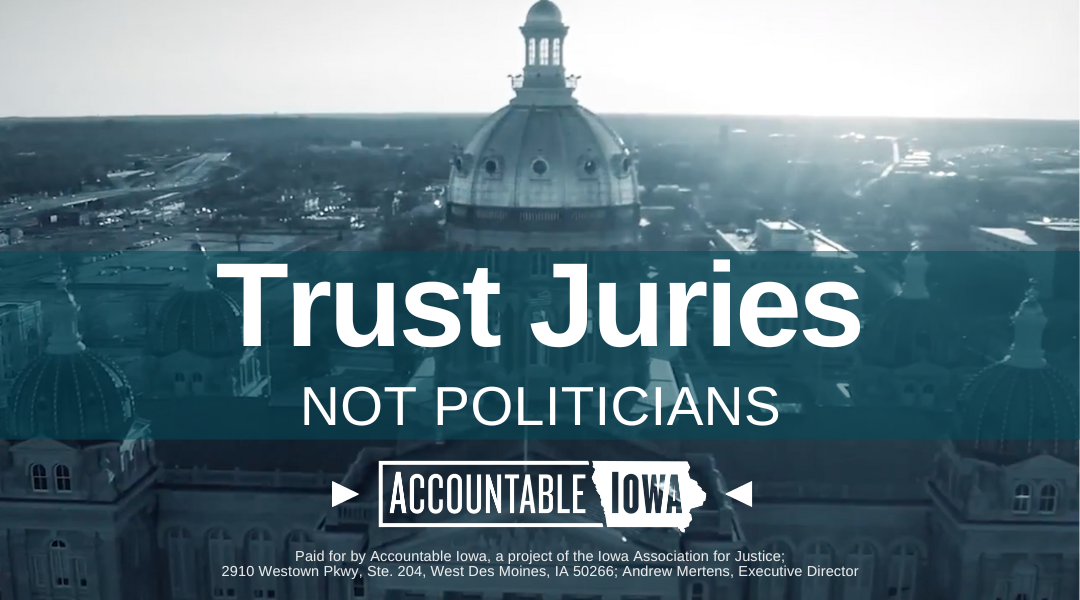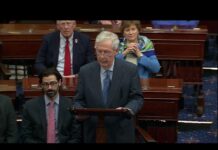By John Hendrickson and Pete Sepp
President Joe Biden and Democrats in Congress are celebrating the recent passage of the American Rescue Plan Act (ARP), which is a $1.9 trillion package aimed at providing COVID-19 relief. The $1.9 trillion “stimulus” is in addition to $4 trillion in previous spending directed towards pandemic relief. The American Rescue Plan will not only add to the escalating $28 trillion national debt, but it further centralizes the power of the federal government over the states. The way that ARP is written may prohibit states from making sound fiscal decisions now and in the future, and if the state relief money comes with those kinds of strings attached, Gov. Kim Reynolds should reject the aid.
ARP provides $350 billion to state and local governments in federal aid. Iowa is expected to receive $2.69 billion of this largess. Advocates of the legislation argue that states and localities need the extra federal aid even though billions in previous “stimulus” money remains unspent. Revenues in many states are not as bad as originally predicted. The American Rescue Plan is targeted toward states such as New York, California, Illinois, among others, ostensibly based on their high unemployment. But even before the COVID-19 pandemic, many of these states’ fiscal houses were collapsing due to poor tax and spending policies.
Governor Kim Reynolds and the Republican-led legislature have been following fiscal conservative principles of limiting spending and reducing tax rates. As a result of conservative budgeting practices, Iowa’s fiscal house was not only prepared for the economic emergency caused by the COVID-19 pandemic but remains in strong condition. Iowa’s budget has a $305 million surplus, and over $770 million in reserves.
During her Condition of the State address during the start of the legislative session, Governor Reynolds stated that she wants to continue to make Iowa’s tax code more competitive and to work toward allowing taxpayers to “keep more of their hard earned money.” A legislative priority for Governor Reynolds is eliminating the revenue triggers that are in place from the 2018 tax reform law.
Iowa’s income tax rate is scheduled to be reduced in 2023, but only if two stringent revenue triggers are met. Iowa’s Senate has already passed a bill out of the Ways & Means Committee that repeals the revenue triggers and gradually phases-out the inheritance tax. Both measures would not only be beneficial for taxpayers but would also make Iowa’s tax climate more competitive.
However, under ARP provisions, states are prevented from using the aid to cut taxes. This not only punishes the taxpayers of Iowa, but it is also an unprecedented power grab by the federal government. It does appear that the law permits local governments to reduce taxes. Rather than rely on one-time funding gimmicks and new programs, local governments across Iowa should use the aid to initiate property tax relief.
Governor Reynolds and the Republican-led legislature have made tax reform a priority in Iowa.
The American Rescue Plan now jeopardizes the elimination of the triggers and any other tax reform that the legislature may consider. Iowa’s Speaker of the House Pat Grassley recently stated that there are number of “unanswered questions” and it remains to be seen if the legislature even has the “ability to pass tax cuts.” Leaders in other states are expressing similar concerns.
Historically, the federal government has often placed certain requirements or restrictions on aid that states receive. Nevertheless, this provision goes against the principles of federalism and may be challenged on constitutional grounds. Since President Franklin D. Roosevelt’s New Deal, the federal government has greatly expanded, and states have become increasingly dependent upon the federal government. The American Rescue Plan is more about expanding government, especially federal power, than it is about economic recovery. President Biden is following in the footsteps of both Presidents Roosevelt and Lyndon B. Johnson.
The American Rescue Plan is another example of the consequence of states accepting federal dollars. Uncle Sam’s generosity is never free. It is also another example of a law passed by Congress that is confusing and requires wide rulemaking by unelected federal bureaucrats.
Iowa’s economy is recovering, and taxpayers should not be punished by having tax reform delayed because of the federal government centralizing power. If federal guidelines affirm that the legislature cannot reduce tax rates, then Iowa should forgo the federal funds. Governor Reynolds should not allow the federal government to dictate Iowa fiscal policy and she should continue to fight for lower taxes and allow taxpayers to keep more of their hard-earned income.
John Hendrickson is policy director of Tax Education Foundation of Iowa and Pete Sepp is President of the National Taxpayers Union (NTU).
















